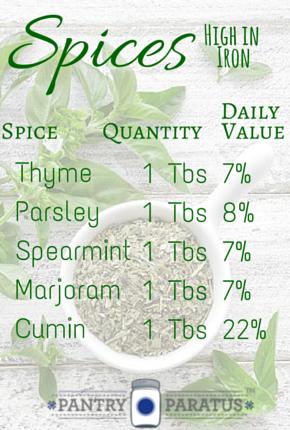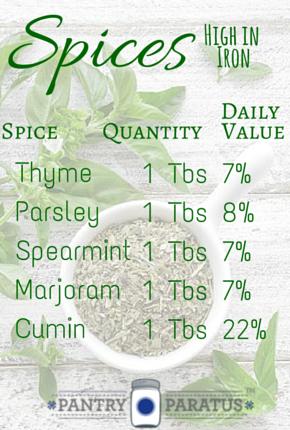
Most people who read the Pantry Paratus blog are learning to cook whole foods in traditional ways, and so it is unlikely that you would have iron deficiencies. I happen to know that many of you prefer cooking in cast iron skillets, which imparts some iron into your food, and that you tend to be meat eaters (based upon the number of Chop Rite meat grinders and meat preservation tools we sell in the course of the year at Pantry Paratus). Just the same, babies who had a low birth weight or other complications, children who do not eat varied diets, women with heavy menstrual cycles, or people who have experienced anemia in the past sometimes need to make a conscientious effort to ensure they are getting a healthy dose of dietary iron. Here are some iron rich spices to help you in your effort.
Conversely, I recently studied up about a genetic disorder that turns out to be somewhat common (in the world of genetic disorders, anyway) called Hemachromatosis, in which a person’s body cannot properly process iron. These individuals can easily solve this iron toxicity through giving blood, but they must also limit the amount of their iron intake! So in either case, I thought I might surprise you all with just how simple it is to get iron into your diet easily and naturally just by what you are adding during kitchen preparation!
One thing you should note: most processed foods such as cereals claim to be high in iron, but they are deceiving you. First, they remove the naturally occurring iron from the grains, and then they replace it with a lesser form of iron that is not nearly as digestible. This is a fascinating piece of food history that daily affects your plate, so I highly recommend you read this article about whole grain.
A dash of Pantry Paratus’ Italian Seasoning or All Purpose Seasoning to your soup, stew, pizza, or pasta will do much to add healthy, natural iron to your diet.
Bon Apetit,
Chaya
Proviso:
Nothing in this blog constitutes medical or legal advice. You should consult your own physician before making any dietary changes. Statements in this blog may or may not be congruent with current USDA or FDA guidance.
Learn more about food’s nutritional data with this helpful database.

